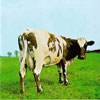 There’s good news and bad news for New Zealand’s dairy industry this week. On the one hand, research has found a number of compounds that can cut methane emissions from ruminants (cows and sheep) by up to 90% by reducing populations of the bacteria that produce the gas. On the other hand, research into the external costs of dairying — the costs not currently born by dairy companies — suggest that dairying’s value to the NZ economy may amount to a “zero sum” game. At the very least the national income generated by dairy sales is significantly offset by the costs of remediating the environmental impacts caused by that farming — costs that are born by the general tax payer, not agribusiness — according to a team from Massey University.
There’s good news and bad news for New Zealand’s dairy industry this week. On the one hand, research has found a number of compounds that can cut methane emissions from ruminants (cows and sheep) by up to 90% by reducing populations of the bacteria that produce the gas. On the other hand, research into the external costs of dairying — the costs not currently born by dairy companies — suggest that dairying’s value to the NZ economy may amount to a “zero sum” game. At the very least the national income generated by dairy sales is significantly offset by the costs of remediating the environmental impacts caused by that farming — costs that are born by the general tax payer, not agribusiness — according to a team from Massey University.
The good news on methane was announced this week at the New Zealand Agricultural Greenhouse Gas Mitigation Conference 2015. Agresearch Principal Scientist Dr Peter Janssen told Radio NZ:
It’s a very exciting result but there’s still a lot of checking to be done before you actually get something that a farmer can use safely.
Interviewed by the NZ Herald, Dr Rick Pridmore, chairman of the NZ Agricultural Greenhouse Gas Research Centre, was upbeat:
The results are significant for two reasons. First, because they work on livestock consuming a grass-based diet and, second because the short-term trials showed such dramatic results,” he said.
However, it might take up to 5 years for these treatments to reach farmers, as the compounds are tested for the possibility of residues in meat and milk.
Cutting methane emissions might reduce diary farmers’ liability under an emissions trading scheme that included agriculture — they are at present excluded — but would have no impact on the other external costs calculated in a new paper, New Zealand Dairy Farming: Milking Our Environment for All Its Worth, which suggests that the costs of repairing the environmental damage done by intensive dairying approaches the value generated by the activity.
One of the authors, Dr Mike Joy told Stuff:
A strong message from the study is that avoiding pollution is far cheaper for everyone than trying to clean it up afterwards and there is now ample evidence that farmers can make more profit and pollute less when not myopically chasing increased production.
Unsurprisingly, the costs calculated in the paper are vigorously contested by farming organisations and some academics, but will chime with New Zealanders concerned that the rapid expansion of industrial dairying is significantly degrading important rural environments and chipping away at what’s left of NZ’s so-called clean green image.

 The NZ Emissions Trading Scheme has failed and should be replaced by a carbon tax, Green Party co-leader Russel Norman
The NZ Emissions Trading Scheme has failed and should be replaced by a carbon tax, Green Party co-leader Russel Norman 
 At the National Agricultural Fieldays earlier this month, climate change minister Tim Groser claimed that including agriculture in the emissions trading scheme would be “utter environmental and economic madness”. At The Daily Blog today,
At the National Agricultural Fieldays earlier this month, climate change minister Tim Groser claimed that including agriculture in the emissions trading scheme would be “utter environmental and economic madness”. At The Daily Blog today,